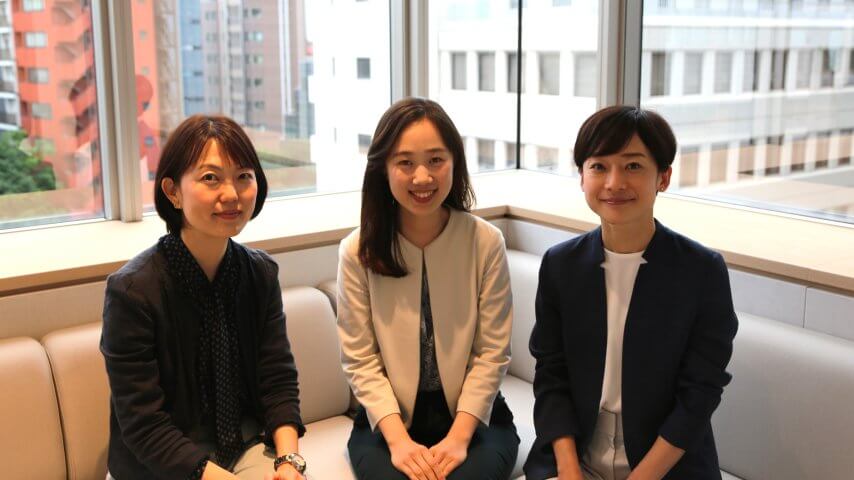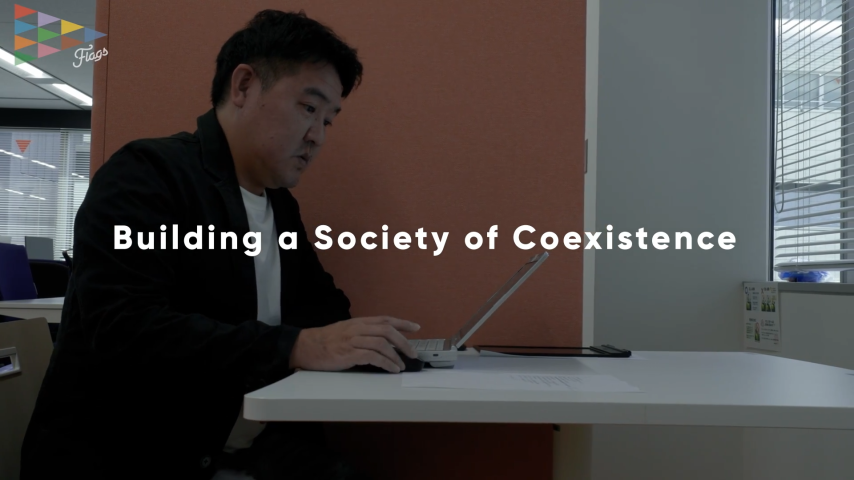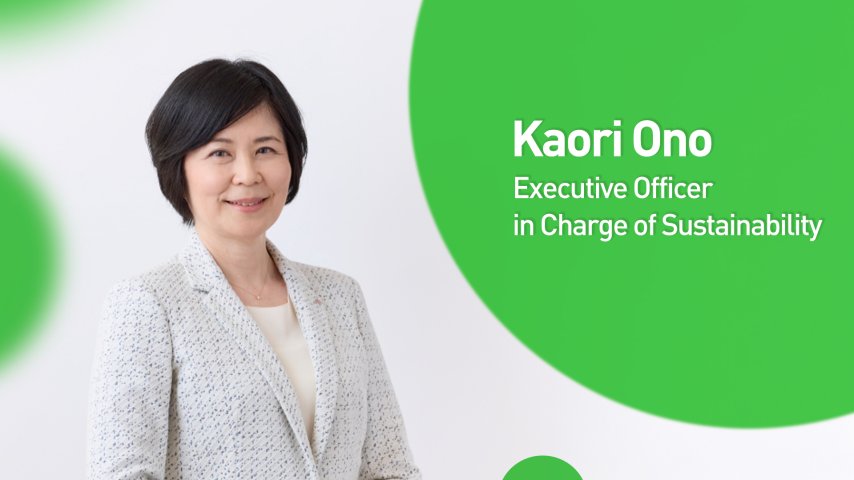Reading Time: 4minutes
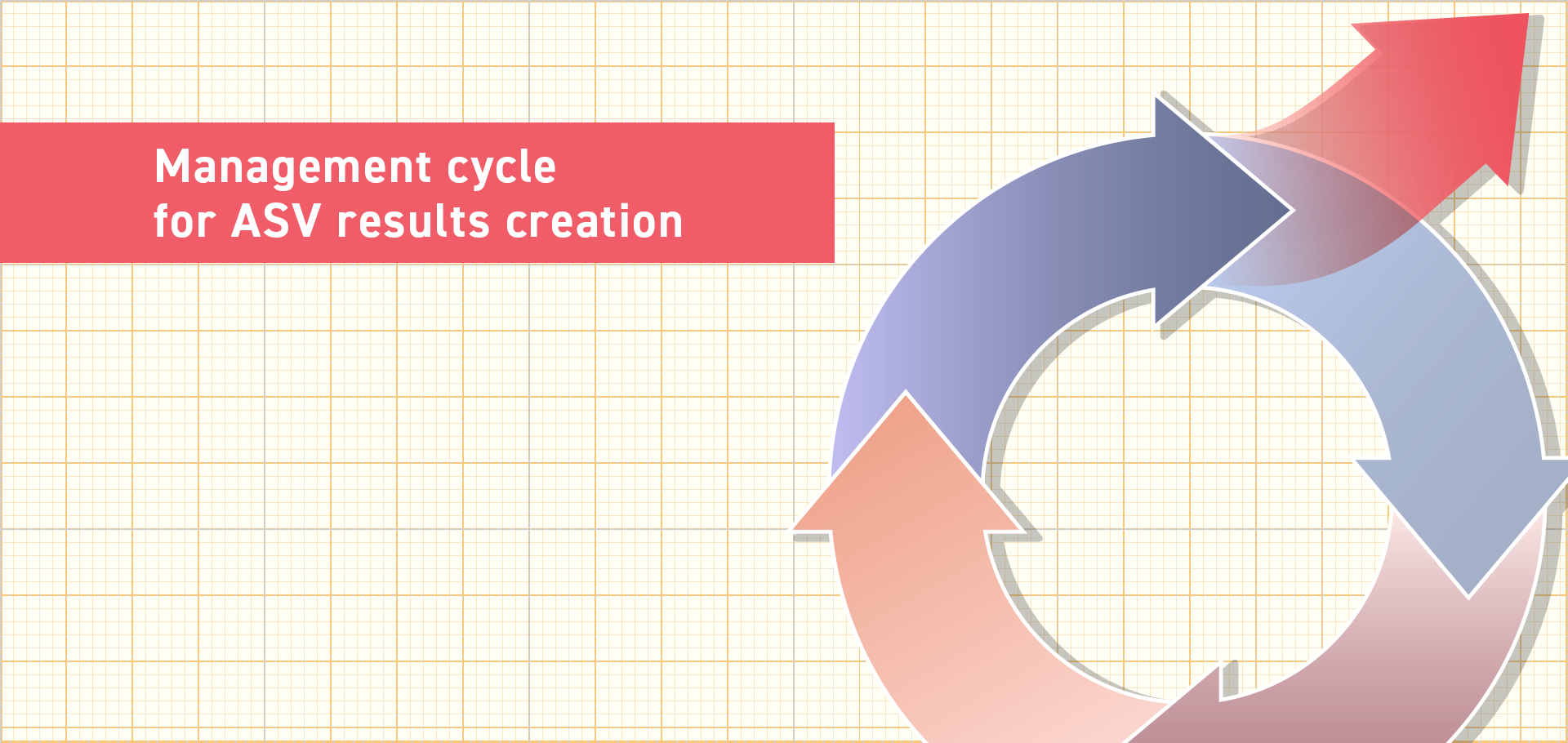
Table of Contents
Like many companies, we have defined our own management philosophy and policy, and embarked on initiatives to help us practice what we preach.
For these initiatives to work, it’s vital that employees internalize the company’s goals as their own initiatives. This naturally presents a challenge, which is why the Ajinomoto Group has introduced a special management system designed to work at the organizational level, promoting a sense of our Purpose in our employees, and enhancing their empathy and engagement.
Growing to help solve social problems!
You might be wondering how our growth could help solve social problems. We’ll now walk you through the process used by the Ajinomoto Group to create social and economic value by helping our employees to relate to our Purpose and internalize the company’s goals as their own initiatives.
What is the management cycle for ASV results creation?
The Ajinomoto Group reformulated its Purpose in 2023.
We define it as contributing to the well-being of all human beings, our society and our planet with “AminoScience” By 2030, we aim to reduce our environmental impact by 50%, and aim to help extend the healthy life expectancy of one billion people.

At the Ajinomoto Group, Our Philosophy consists of four elements: our Corporate Slogan, our Purpose, ASV and the Ajinomoto Group Way (AGW).
The realization of our Purpose is what we call “ASV.”
ASV stands for Ajinomoto Group Creating Shared Value.
ASV means that, rather than pursuing our own sales and profit exclusively, we’re creating social value by addressing social problems through our business, and thereby creating economic value too.
Making ASV happen will take more than the efforts of our management alone. We need the power of every employee in the Ajinomoto Group’s global workforce.
We’re aiming for a corporate culture where each employee considers the overlap between the Group’s Purpose and their own “My Purpose,” taking ownership of their own work, and striving continuously to achieve our shared vision of what we want to be.
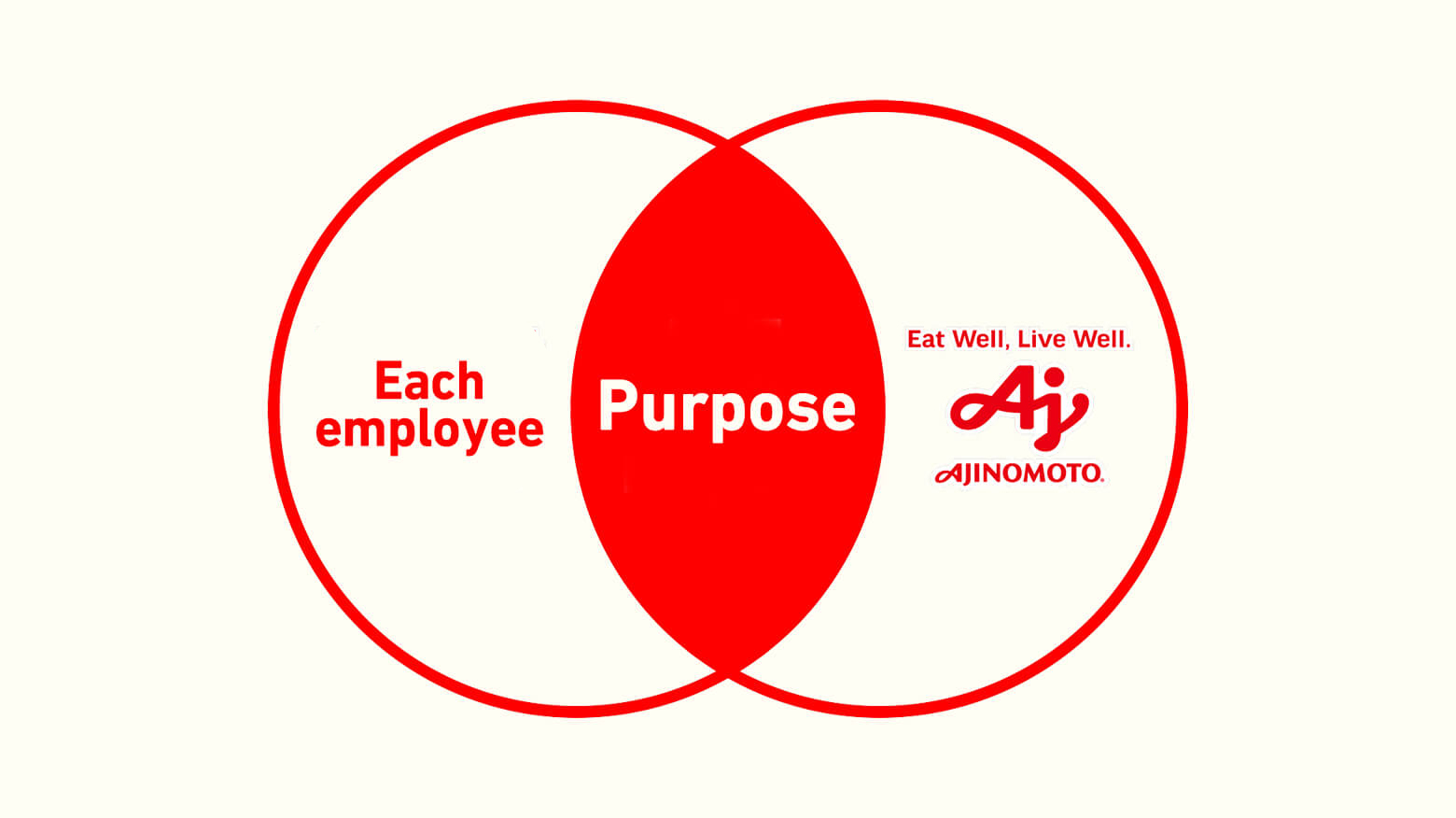
To speed up the process from acquiring the “ASV as one’s own initiative” mindset at the individual level to creating results at the organizational level, the Ajinomoto Group has introduced a unique system we call the management cycle for ASV results creation.
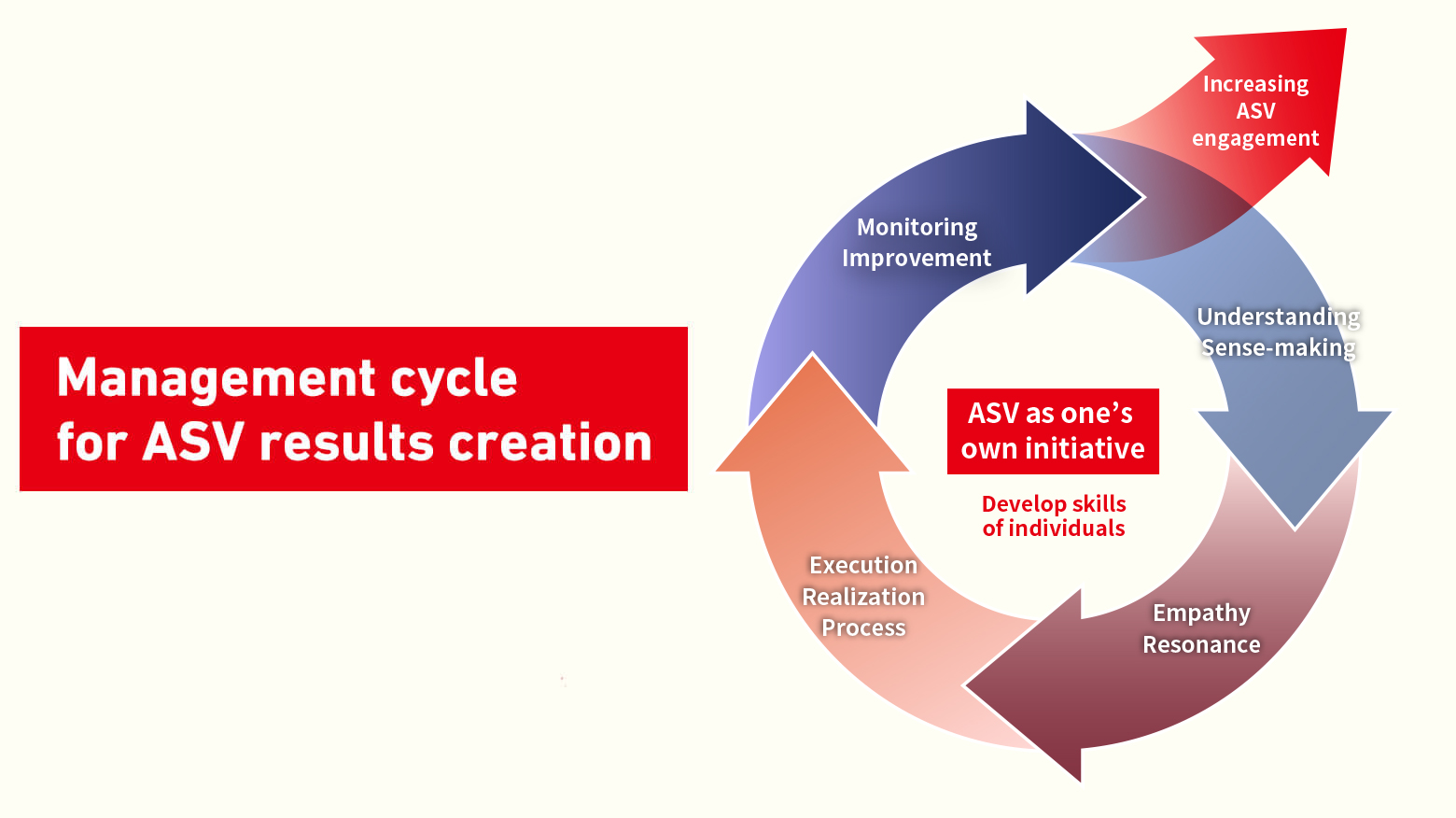
Why does the Ajinomoto Group have such a high employee engagement score?
For employees working as members of a business organization, internalizing the company’s goals as their own initiatives means perceiving the company’s goals and challenges as their own, and addressing those goals and challenges proactively and with a sense of ownership. Internalizing the company’s goals as their own initiative is likely to enhance employee engagement and productivity, and strengthen team cohesion.
Of course, all this is easier said than done.
Our engagement survey for fiscal year 2024 showed that the Ajinomoto Group has achieved an employee engagement score of 76%.
What is an Employee Engagement Score?
Employee engagement is typically defined as the level of emotional investment and enthusiasm or the depth of connection felt by employees towards their company. An employee engagement score is a numerical evaluation used to measure employee engagement. Using the engagement survey described below, we analyze the degree to which our employees have acquired the “ASV as one’s own initiative” mindset, and use the result as an annual metric for our progress towards ASV.
One of the reasons why we have achieved an employee engagement score of 76% is that since fiscal year 2020, the Ajinomoto Group has been strengthening the “ASV as one’s own initiative” mindset by working on the management cycle for ASV results creation, implementing appropriate measures at every step of the process.
Focusing on the Ajinomoto Group's intangible assets
Another reason for implementing the management cycle for ASV results creation is to strengthen our intangible assets.
In order to attain our Purpose, the Ajinomoto Group is focusing on investing in our intangible assets. We define four categories: technology assets, human assets, customer assets and organization assets.

What are intangible assets?
Unlike tangible assets such as the land, buildings, machinery, and equipment owned by a company, intangible assets include human assets such as human skills and experience, management methods, technical know-how, intellectual property and brand value, among other things.
Of the four categories of intangible assets defined by the Ajinomoto Group, human assets are the most important.
We recruit and nurture diverse human resources with the passion and drive to achieve our Purpose, who produce innovation by matching our technologies with customer issues, and who maintain close connections with the peoples and cultures of the world. This human resources strategy is designed to help us create innovations for the future.
A key part of our human resources strategy is the management cycle for ASV results creation, a system created to help us attain our Purpose.
The management cycle for ASV results creation already set in motion by the Ajinomoto Group includes a training policy focused on human capital management, along with goal setting, internalizing the company’s goals as one’s own initiative, diversity, and our in-house engagement survey.
We see the management cycle for ASV results creation as an important element of our human resources strategy, which itself plays a key role in bolstering the Ajinomoto Group’s intangible assets.
Next, we’ll walk you through the management cycle for ASV results creation.
The four steps of the management cycle for ASV results creation
The management cycle for ASV results creation has four main steps.
These are Understanding/Sense-making, Empathy/Resonance, Execution/Realization, and Monitoring/Improvement.
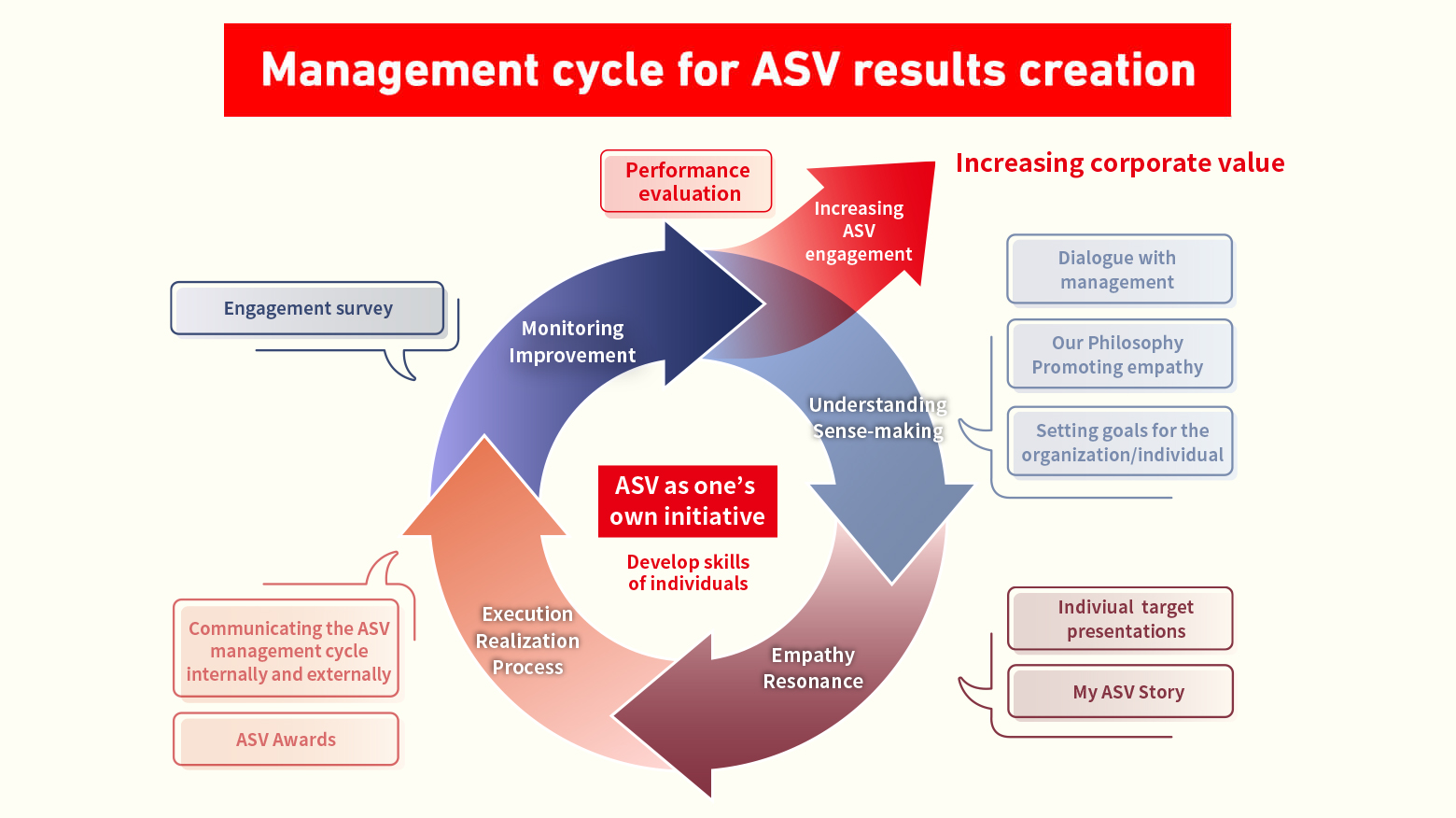
The first step is Understanding/Sense-making.
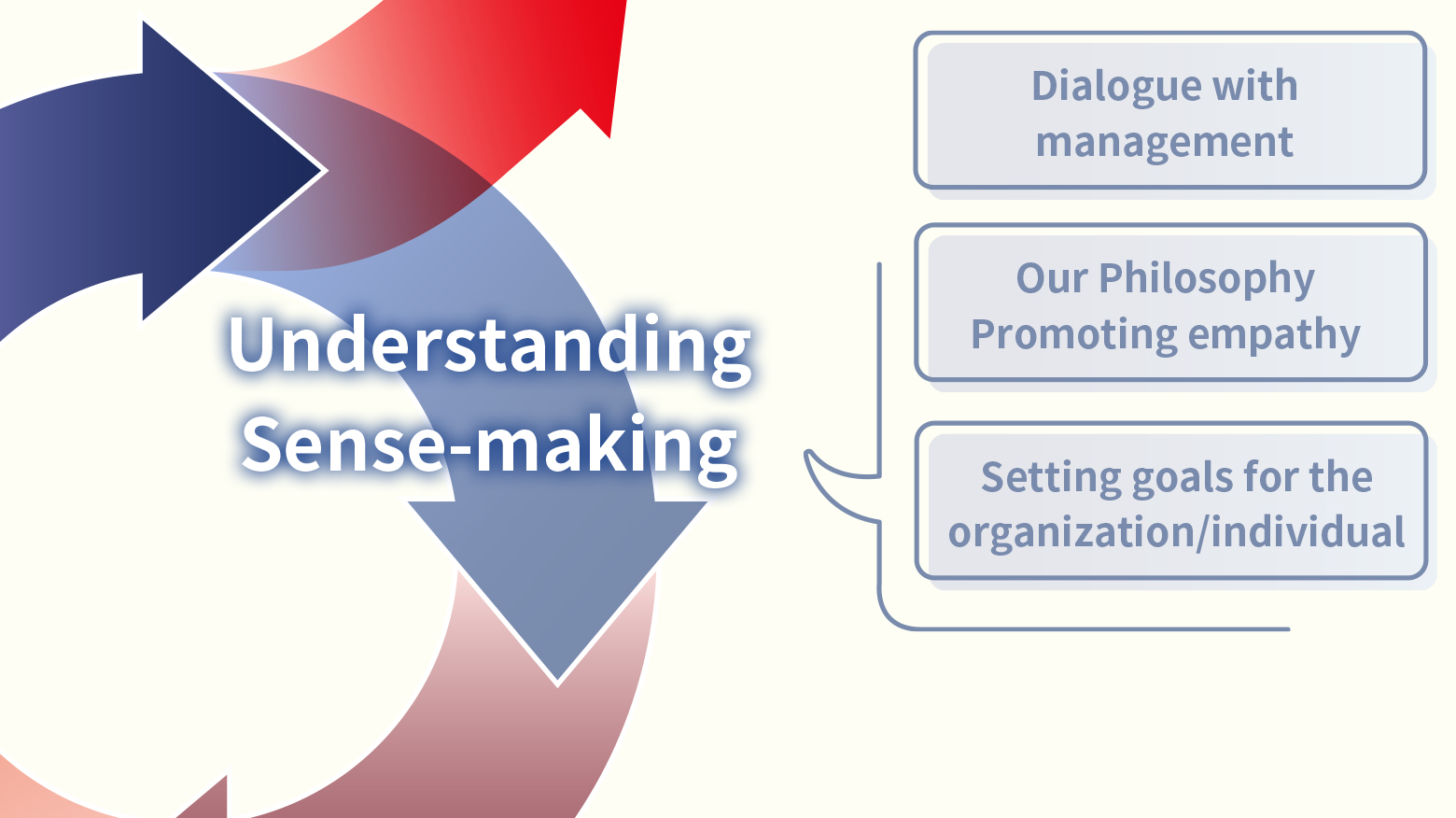
The process of enhancing ASV engagement begins with having employees engage in a dialogue with the CEO, with the General Managers of each division, with the corporate leaders of Group companies, and with other management.

In dialogues with the CEO, we aim to foster broad and meaningful two-way communication by combining organization- and department-wide discussions with smaller group sessions open to voluntary participants.
Through this collective dialogue with management, employees come to understand and make sense of our management policy and our Purpose. Then, having internalized the company’s goals as their own initiative, they go on to set personal goals linked to the goals for their own organization.
We are also promoting engagement through the “Our Philosophy empathy promotion activities,” which connects employees and the company through shared purpose.
As part of this initiative, we hold workshops in which employees identify and articulate the overlap between their personal aspirations – “My Purpose” – and the Ajinomoto Group’s aspirations – “Our Purpose.” Participants reflect on and share their strengths, values, and goals with their peers.
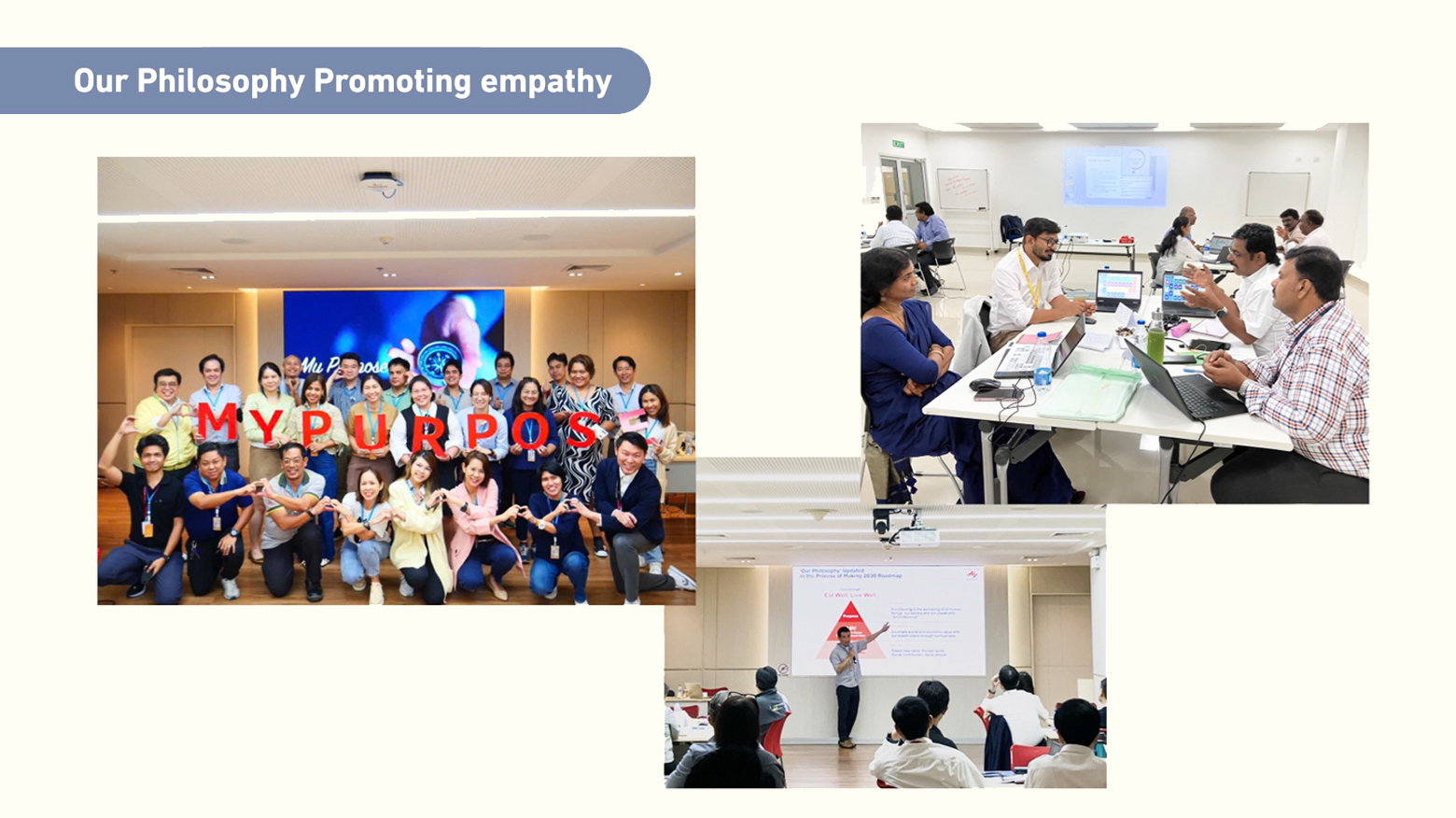
The second step is Empathy/Resonance.
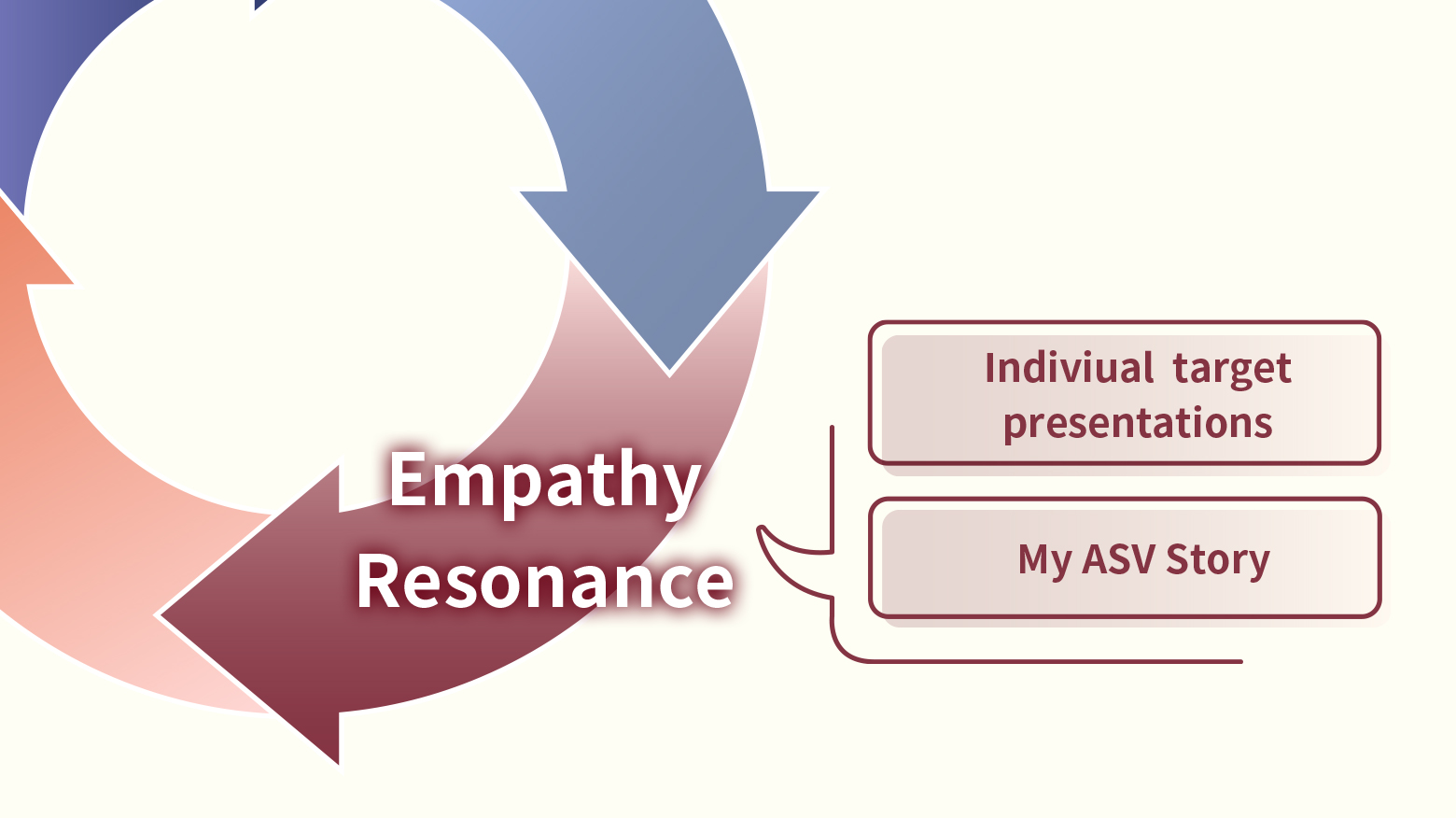
At the Empathy/Resonance stage, employees give individual target presentations. Having identified the customers served and the value created on the way to their own targets, and worked out how their own work leads to ASV, they share their understanding with their colleagues. This raises mutual awareness of individual targets, fostering an organizational culture where employees empower one another to tackle new challenges.
By having employees announce the ASV they want to achieve through their own work at their individual target presentations, we are creating a corporate culture where each employee is supported by the empathy of their colleagues while taking on new challenges. Through individual target presentations, presenters share their success stories and discuss their challenges, creating opportunities to connect their aspirations with their work. In this way, each organization independently makes improvements, working toward realizing ASV. In fiscal 2024, personal goal presentation sessions were held at 29 Ajinomoto Group companies in Japan and around the world.
At AJINOMOTO CO., (THAILAND) LTD, for example, a total of 1,800 employees attended these sessions in 2023, representing an employee participation rate of 100%. Employees from every department, including research, production, business and corporate, took part in lively Q&A sessions. This raised mutual awareness of individual targets, fostering an organizational culture where employees empower one another to tackle new challenges.

In 2023, individual target presentations at AJINOMOTO CO., (THAILAND) LTD scored an employee participation rate of 100%!
At AJINOMOTO DO BRASIL INDUSTRIA E COMÉRCIO DE ALIMENTOS LTDA., individual target presentations are held remotely. Presentations held so far have covered personal targets ranging from technology to reducing discharges of wastewater and effluent for the production department, utilizing digital transformation (DX) for production management, and addressing food and health issues in Latin America.

At AJINOMOTO DO BRASIL INDUSTRIA E COMÉRCIO DE ALIMENTOS LTDA., individual target presentations are held remotely.
Ajinomoto Group employees also share their ASV case studies on our Group’s own internal social-media-style platform Workplace.
The third step is Execution/Realization.
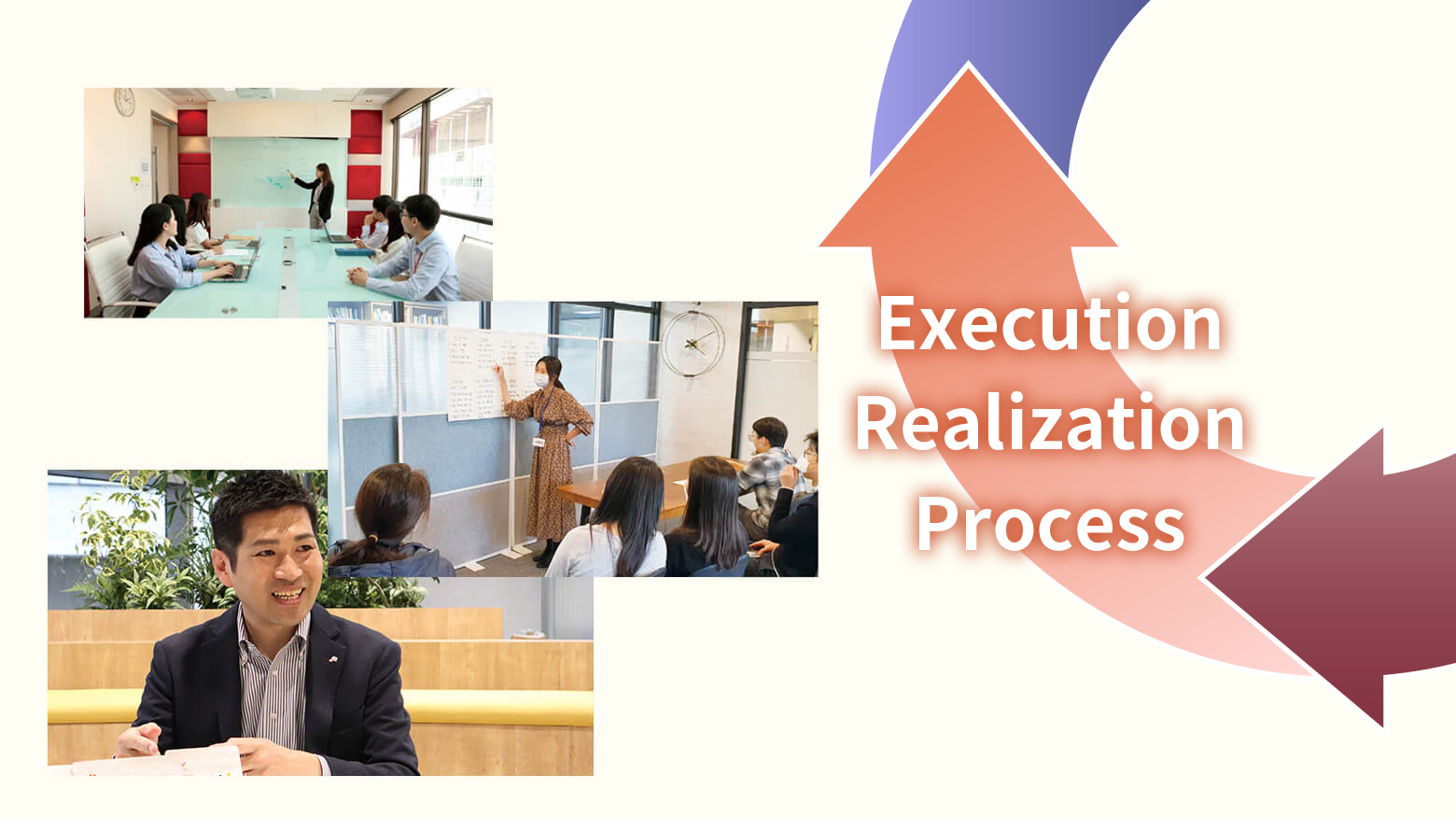
Execution/Realization is the process whereby individual employees who have acquired the “ASV as one’s own initiative” mindset spontaneously take on new challenges, transcending organizational and other barriers to work as a team towards the realization of ASV.
Outstanding initiatives that embody ASV are recognized by ASV Awards.
Ajinomoto Co., Inc. also runs the A-STARTERS business incubator program for budding in-house entrepreneurs.
The results and sense of achievement arising from these initiatives enhance employee ASV engagement and increase our corporate value.
What are the ASV Awards?
The ASV Awards recognize outstanding initiatives that embody ASV.
In fiscal 2023, the global One Team “AjiPro-Green,” which is working to reduce greenhouse gas emissions from dairy and beef cattle using AjiPro™-L, was awarded the Gold Prize.
Blending AjiPro™-L, a lysine-based amino acid formulation for cattle, into feed not only helps maintain animal health but also contributes to reducing greenhouse gas emissions from cattle. At the same time, it lowers feed costs, which is earning widespread attention from dairy and livestock farmers, as well as dairy and meat producers around the world.
What is A-STARTERS?
In March 2020, Ajinomoto Co., Inc. launched an employee-led business incubator program named “A-STARTERS.”
This is a groundbreaking initiative whereby any employee, regardless of department, position or career track, will be offered the opportunity to lead the new initiative if he or she submits an idea that ends up being selected.
August 2023 saw the service launch of “LaboMe”, the program’s first startup.
There is value in making a full swing! What is "Swing the Bat?"
One of the initiatives meant to foster a corporate culture that continues to step up to challenges without fear of risk is “Swing the Bat,” organized by the Marketing Design Center. The name literally means to swing the bat with all your might, or to boldly take on a challenge. Regardless of the success or failure of the project or the amount or scale of the results, we have established a unique award to cheer employees on who step up to challenges, and present the awards twice a year, in the first and second halves.
The awards are open to all employees of the Center. Applications can be made via self-nomination or via recommendation from a direct supervisor, and the selection criteria are: “Did you take a ‘full swing’ with a clear aim, even if it did not lead to results?” and “Did it take shape and allow you to ask consumers its value?”
What lies ahead is creating an environment that allows for free and bold ideas without being constrained by conventional frameworks. A corporate culture that allows everyone to take a “full swing” is an important organization asset that is essential to achieving ASV. The Ajinomoto Group will roll out this “Swing The Bat” initiatives and other initiatives to promote challenges at a company-wide level, aiming to further foster our corporate culture.
The final step is Monitoring/Improvement.
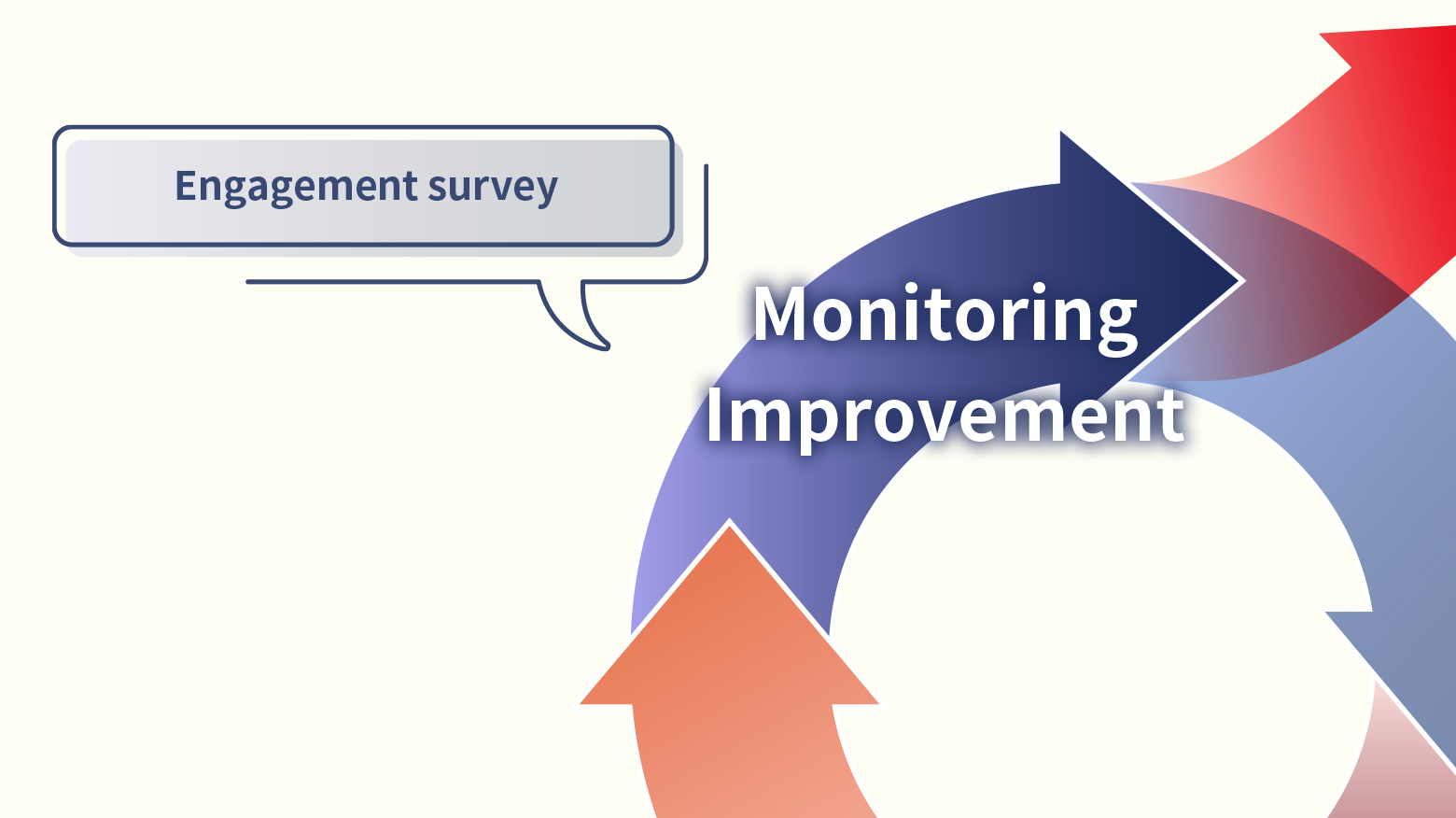
At the Monitoring/Improvement stage, we analyze the results of our annual engagement survey to measure progress made in employee ASV engagement. Challenges identified from the findings are then addressed in our plan for the following year.
Thanks to this initiative, the employee engagement score achieved by the Ajinomoto Group in fiscal year 2024 was 76%. By fiscal year 2030, we aim to raise this to 85%.

However, driving up our employee engagement score is not our sole focus. It’s also important to pay attention to the correlation between employee engagement and business performance.
Since fiscal year 2022, we have disclosed the correlation between employee engagement and business performance, and since fiscal year 2023, we have also disclosed our approach to the ASV realization process. We are speeding up our identification of opportunities and issues correlating with the scores for particular questions in the engagement survey. By making sure each organization has someone in charge of analyzing the engagement survey results, and by holding workshops at beginner and advanced levels and providing other training, we are encouraging organizations to make autonomous use of the information yielded by the survey.
As part of our drive to bolster our intangible assets, we measure our employee engagement score. We do this by finding the average score for the nine survey questions designed to assess the effectiveness of each step of the ASV realization process, from Understanding/Sense-making through the “ASV as one’s own initiative” mindset, to creating results at the organizational level.
The nine engagement survey questions
The relevant sections are: empathy for our purpose, customer focus, “ASV as one’s own initiative,” encouragement for new opportunities, co-creation through inclusion, enhancement of productivity, innovation creation, and creation of social and economic value.
What is the correlation between employee ASV engagement and business performance?
We have already described the initiatives that lead to higher ASV engagement among our employees. Now we’ll explain how higher ASV engagement translates into improved business performance.
Every year, the Ajinomoto Group updates the results of the engagement survey, and analyses how the scores for particular questions correlate with business results. From the survey results for the past five years, we have ascertained that the scores for empathy for our purpose, customer focus, and enhancement of productivity correlate with both sales and business profit per employee.

Through the processes of Understanding/Sense-making, Empathy/Resonance, Execution/Realization and Monitoring/Improvement, the actions of each individual employee help to solve social problems and create a better future. By promoting the “ASV as one’s own initiative” mindset and working towards the realization of ASV, new social and economic value is being created at this very moment.
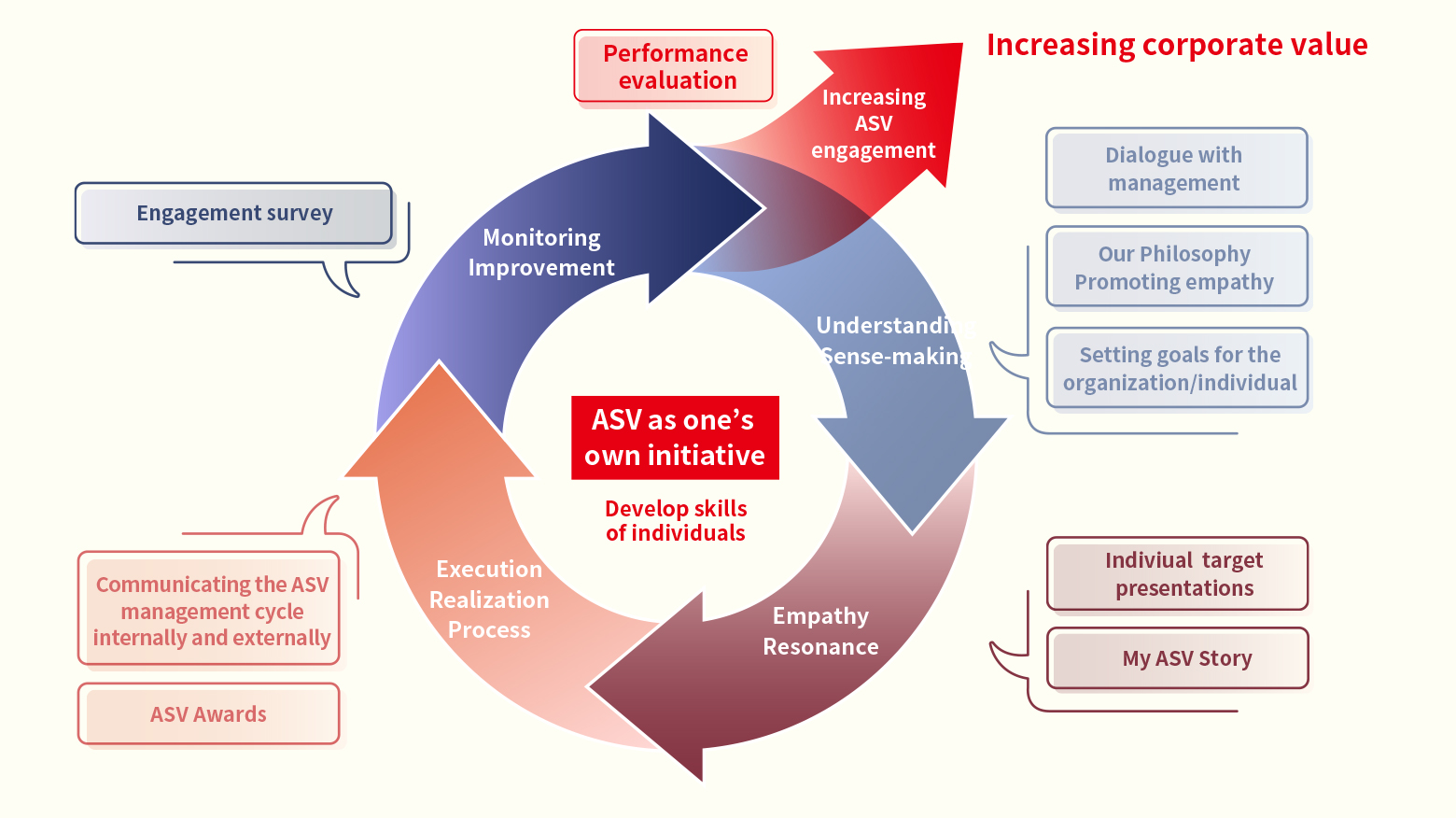
By evolving its management cycle for ASV results creation initiatives, the Ajinomoto Group will continue empowering its individuals and organizations to grow and develop together while ceaselessly enhancing its corporate value.
Growing to help solve social problems! What is the Ajinomoto Group's management cycle for ASV results creation?
The Ajinomoto Group Employee Talks About Efforts to Boost Engagement.
Major projects born of ASV initiatives
In addition to the examples covered in this article, other projects born of ASV initiatives can be found in the Stories section.
- A school lunch program in Vietnam aims to improve children’s health
- Nurturing young minds and bodies: School Lunch Program in Indonesia
- A local approach to improving nutrition in Japan targets vegetable consumption
- Smart solutions to reducing salt without compromising taste
- Confronting the “silent killer” in Vietnam: delicious salt reduction using umami
- How to eat for success: program for athletes benefits everyone
- The Thailand Victory Project®— a recipe for success
- Supporting Paralympians: what we can learn from Japan’s blind footballers
- ASEAN Victory Project® puts Thai and Malaysian athletes in winning form for Vietnam’s SEA Games
- Nurturing future champions—a sports nutrition awareness project targets student athletes in Malaysia
- Sports and nutrition in the age of COVID: new website chronicles Indonesian swim champion’s winning journey
- HONDASHI® Paper Packaging: Reducing Plastic Waste and Adding Fun
- The road to zero plastic waste: Ajinomoto Indonesia succeeds through private-public partnership
- AJI-NO-MOTO® paper packaging: reducing plastic waste
- Empowering Sustainable Dairy Farming
- AMIHOPE®SB—Amino acid technology gives new hope to reducing microplastics
Explanation of terminology used
Engagement
In its broadest sense, the word “engagement” includes such meanings as betrothal, promise and contract, and is found in familiar phrases such as “engagement ring.” In the context of corporate human resources, however, the phrase “employee engagement” is used to express the level of emotional investment and enthusiasm or the depth of connection felt by employees towards their company.
Low employee engagement can lead to issues such as an outflow of talent and a decline in productivity, so initiatives aimed at increasing engagement are important. High employee engagement contributes directly to the company’s success and is therefore regarded as a very important element in terms of maximizing corporate value.
Engagement survey
An engagement survey is a survey designed to measure the level of engagement among employees at a company. It quantifies the strength of connection felt by the employees towards the company, and can be used to gauge the degree to which the employees feel positively about the company and their own work.

